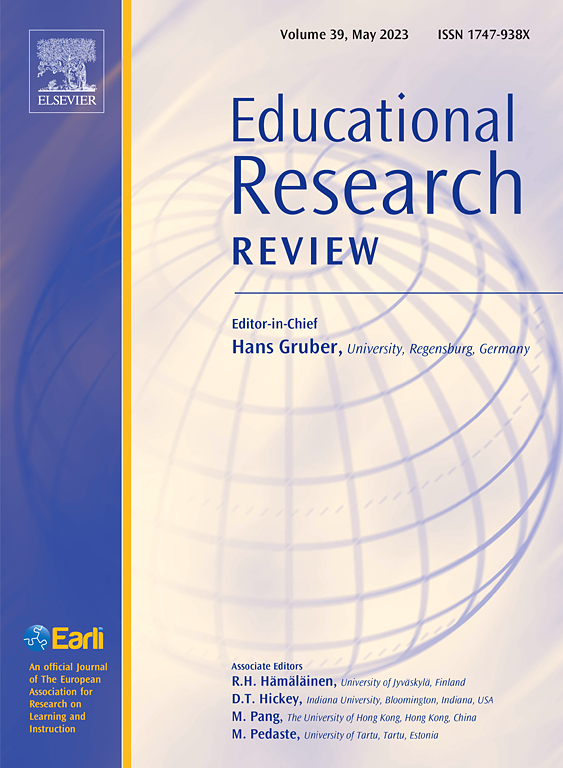When personal becomes relational: A meta-analysis and narrative review on personality traits and children's affective relationships with adults
IF 10.6
1区 教育学
Q1 EDUCATION & EDUCATIONAL RESEARCH
引用次数: 0
Abstract
In this meta-analysis and narrative review, we investigated whether personality traits of children and adults (i.e., parents and teachers), as well as personality similarity, were associated with the affective quality of dyadic adult–child relationships. We conducted a systematic literature search following PRISMA guidelines. By performing a quantitative meta-analysis (k = 39), we examined the associations of children's and parents' personality traits with parent–child relationship quality. Due to a limited number of available studies, associations between personality traits and teacher–child relationships (k = 8) and between personality similarity and adult–child relationships (k = 4) were explored through a narrative review. The meta-analytic findings indicated that children's agreeableness, conscientiousness, extraversion, and openness were positively associated with positive parent–child relationships (e.g., warmth) and negatively associated with negative parent–child relationships (e.g., conflict). In contrast, children's neuroticism was negatively associated with positive parent–child relationships and positively associated with negative parent–child relationships. Comparable patterns were found for parents' personality traits; however, parents' openness was not significantly associated with either positive or negative parent–child relationships. Furthermore, the narrative review suggested that personality traits of both children and teachers may be associated with teacher–child relationships, especially for relational positivity. Finally, preliminary evidence indicated that personality similarity appeared to be positively associated with positive adult–child relationships. Although the results we found were small to medium in magnitude, these findings suggest that focusing on personality may be a promising way to better understand children's affective relationships with adults in various contexts (e.g., family, school).
当个人变成关系:人格特质与儿童与成人情感关系的元分析与叙事回顾
在本荟萃分析和叙述性回顾中,我们调查了儿童和成人(即父母和教师)的人格特征以及人格相似性是否与二元成人-儿童关系的情感质量相关。我们按照PRISMA指南进行了系统的文献检索。通过进行定量荟萃分析(k = 39),我们检验了儿童和父母的人格特质与亲子关系质量的关系。由于现有的研究数量有限,我们通过叙述回顾来探讨人格特质与师生关系(k = 8)和人格相似性与成人与儿童关系(k = 4)之间的关系。元分析结果表明,儿童的亲和性、严谨性、外向性和开放性与积极的亲子关系(如温暖)呈正相关,与消极的亲子关系(如冲突)负相关。儿童神经质与正向亲子关系负相关,与负向亲子关系正相关。在父母的性格特征上也发现了类似的模式;然而,父母的开放程度对亲子关系的正向或负向影响均不显著。此外,叙述性回顾表明,儿童和教师的人格特质可能与师生关系有关,尤其是关系积极性。最后,初步证据表明,性格相似性似乎与积极的成人-儿童关系呈正相关。虽然我们发现的结果是小到中等量级,但这些发现表明,关注个性可能是更好地理解儿童在各种环境下(例如,家庭,学校)与成人的情感关系的有希望的方法。
本文章由计算机程序翻译,如有差异,请以英文原文为准。
求助全文
约1分钟内获得全文
求助全文
来源期刊

Educational Research Review
EDUCATION & EDUCATIONAL RESEARCH-
CiteScore
19.40
自引率
0.90%
发文量
53
审稿时长
57 days
期刊介绍:
Educational Research Review is an international journal catering to researchers and diverse agencies keen on reviewing studies and theoretical papers in education at any level. The journal welcomes high-quality articles that address educational research problems through a review approach, encompassing thematic or methodological reviews and meta-analyses. With an inclusive scope, the journal does not limit itself to any specific age range and invites articles across various settings where learning and education take place, such as schools, corporate training, and both formal and informal educational environments.
 求助内容:
求助内容: 应助结果提醒方式:
应助结果提醒方式:


